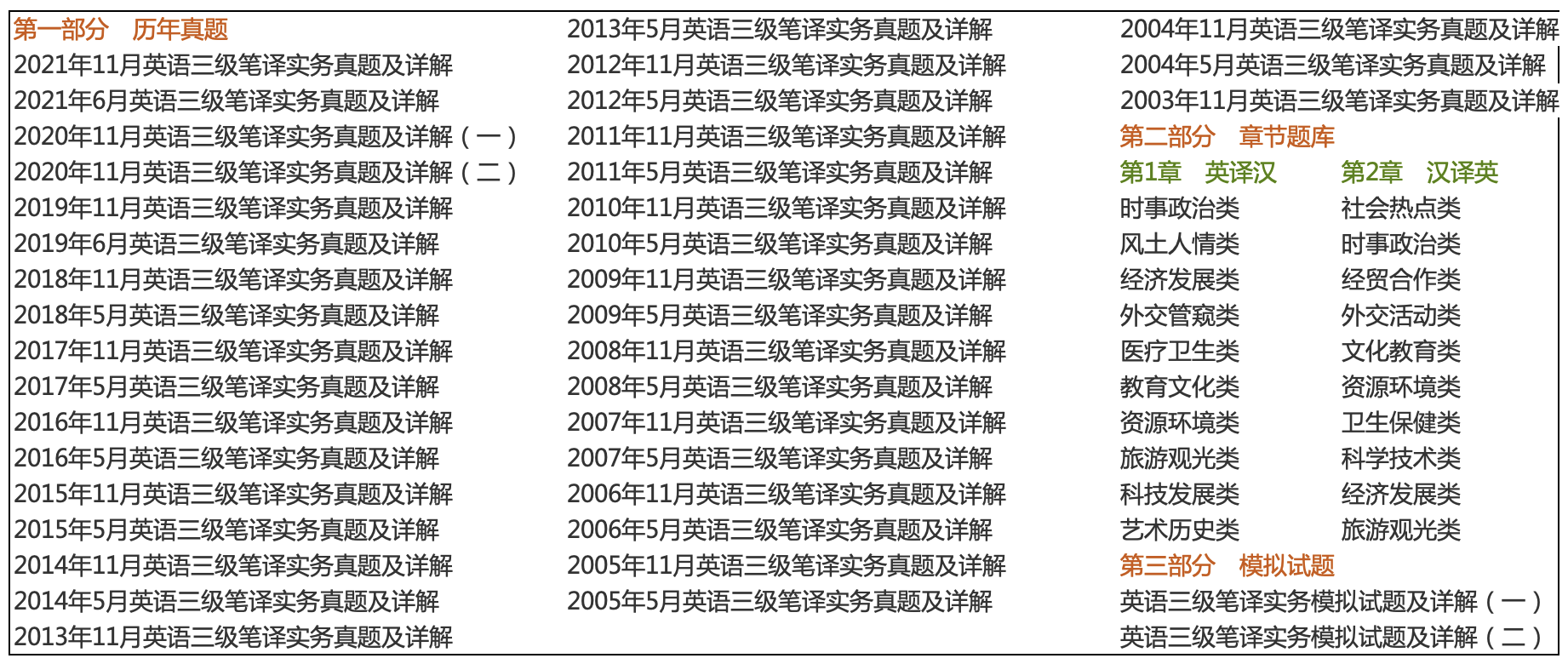全国翻译专业资格(水平)考试英语三级笔译实务题库【历年真题+章节题库+模拟试题】
全国翻译专业资格(水平)考试英语三级笔译实务题库【历年真题+章节题库+模拟试题】
第一部分为历年真题。收录2003~2021年考试真题,每套真题均提供参考译文,部分真题含有采分点解析。
第二部分为章节题库。遵循《全国翻译专业资格(水平)考试英语笔译三级考试大纲》和英语三级《笔译实务》考试样题,按照最新的考试题型的章目编排,共分为英译汉和汉译英2章。
第三部分为模拟试题。根据常考知识点,参考相关真题,精心设计两套模拟试题,便于考生检测复习效果。
立即阅读 >>
翻译资格英语三级笔译实务历年考试真题及答案详解 【完整内容点击文中链接获取】
一、Section 1 English-Chinese Translation (50 points)(Translate the following passage into Chinese.)
1Stop reclining your airplane seat.
Two domestic airlines already limit your ability to lean back in economy class. Even if the airline doesn't make the decision for you, it’s the polite thing to do. And, most important, it’s the right thing to do.
“Seat reclining is one of the most irritating, inconvenient, self-indulgent habits,” says Simon Sapper, an organizational consultant and frequent traveler based in London. “Period.”
But click around the internet for a while, and you’ll find that this debate is far from settled. Many of the blogosphere’s “experts” believe it’s their God-given right to recline. Ironically, the loudest seat recliners don’t even fly in economy class.
So, as a public service, let’s settle this argument now. Reclining your airline seat is unacceptable because we’re officially out of space. It’s rude—and it’s wrong.
There’s no space to recline. Airlines are trying to squeeze more passengers on a plane to make more money. Before airline deregulation, many economy class seats had a generous 36 inches of “pitch,” a rough measure of legroom. Today, some seats have as little as 28 inches.
“I feel most folks would rather sacrifice the 2 inches of reclining backward not to have someone sitting in their lap for the distance of a flight,” says Mary Camillo, a travel advisor from Middletown, New Jersey. “Airlines should instill on passengers what parents have been trying to instill in their children for years. That is, if you do not have enough to share with everyone, then wait until you do.”
Also, airlines should immediately stop using the phrase “Sit back, relax, and enjoy the flight.” That’s an invitation to lean back all the way. But it’s a cruel joke. On two airlines—Delta and Spirit—you can’t fully recline. On other airlines, you’ll invade another passenger’s personal space, which might lead to an unfriendly confrontation.
You can do a lot of things on a plane. For example, you can tell your life story to your seatmate. You can eat a Limburger cheese and Bermuda onion sandwich. You can press the flight attendant call button repeatedly. But all are probably bad ideas.
“Seat recline is a moral issue,” says Jennifer Aspinwall, a frequent air traveler who writes the World On A Whim blog. “What do you do if the person in front of you reclines all the way? What if you turn around to discover that a 6-foot-4 passenger seated behind you? Do you eat your meal in your lap while the tray table cuts into your stomach or do recline as well and crush the legs of the person behind you?”
Couldn’t have said it better myself. Reclining a seat is wrong.
Airlines should lock their economy seats from reclining—permanently.
So if there’s no room to recline your airplane seat, and it’s wrong, why do so many airlines still allow it? Because if they didn’t, it would be an admission that they no longer care about your comfort. Airlines are stacking you into a plane like cargo—no two ways about it.
“I wish all airlines would eliminate the recline function,” says Larry Hickerson, a retired Air Force inspector and million-miler from Peoria, Arizona. “Since airlines went to ridiculously tight pitches, recline sets up an untenable situation.”
Right now, about half the people reading this column probably want to name their firstborn after me. The other half want to kill me. And the airline folks? They’re laughing.
The airline industry loves the seat reclining argument because it divides us. And while we’re arguing about 2 inches of personal space, they’re busy collecting more money from passengers and slowly—ever so slowly—removing even more room. This debate is the perfect distraction.
Whether you think reclining your airline seat is wrong or not, let’s agree on one thing: Greedy airlines got us to this point. Fighting over the scraps of space won’t fix it. If we ever needed thoughtful government regulation, maybe it is now.
How to deal with a seat recliner?
Reclining an airline seat is still allowed on most domestic flights. Here’s how to deal with someone who leans into your airspace.
Ask them to lean forward. Timing and tone are important here. The moment someone leans back, gently tap the person on the shoulder and politely ask them if it would be possible not to recline their seat. Be. Extra. Nice.
Get a flight attendant involved. Some leaners are clever and wait for you to go to the restroom before leaning. Then they feign sleep, which makes you reluctant to bother them. Oldest trick in the book. You can always ask a flight attendant for help.
Move airplane seats. If you see another open seat in your class of service, feel free to move, as long as the seat belt sign isn’t illuminated. You might also want to ask a flight attendant for permission. As a reminder, the seats in front of the exit row don’t recline. So usually, an exit row seat means you’ll keep your legroom. And maybe, your sanity.

| 内容来源 | 全国翻译专业资格(水平)考试英语三级笔译实务题库  |
【解析】
(1)Two domestic airlines already limit your ability to lean back in economy class. Even if the airline doesn't make the decision for you, it's the polite thing to do. And, most important, it's the right thing to do. 两家美国航空公司已经限制了经济舱乘客放低座椅靠背的能力。即使航空公司没有这样做,那也是出于礼貌。最重要的是,这是一项正确的举措。
[分析]选词用词采分点。domestic不能直接译为“国内的”,此处指的是“美国的航空公司”。lean back,同后文的recline,在此处表示“放低座椅靠背,向后仰躺”,要代入语境,将其正确含义解释清楚。
(2)“Seat reclining is one of the most irritating, inconvenient, self-indulgent habits,” says Simon Sapper, an organizational consultant and frequent traveler based in London. “Period.” “放低座椅靠背是最恼人、最易造成不便、最自私的一种习惯,”常驻伦敦的组织顾问西蒙·萨珀(Simon Sapper)经常出差,他说,“这种习惯必须立刻终止”。
[分析]选词用词采分点。Period放在句尾单独成句,一般是口语的用法,强调前面的内容很重要,可以翻译为“就这样;到此为止”。
(3)I feel most folks would rather sacrifice the 2 inches of reclining backward not to have someone sitting in their lap for the distance of a flight. 我觉得大多数人宁愿牺牲那2英寸的仰躺空间,也不愿在飞行途中一直坐在他人腿上。
[分析]理解结构采分点。would rather...not to...结构可以译为“宁愿…也不愿…”,have sb. Doing意思是“让某人一直做某事”,现在分词sitting引导的动词短语充当使役动词have的宾语补足语。
(4)Airlines should instill on passengers what parents have been trying to instill in their children for years. That is, if you do not have enough to share with everyone, then wait until you do. 父母多年来一直给孩子灌输这样一个观念:对于某样东西,如果你尚未拥有足够的量可以和所有人分享,那就等你拥有足够的量再去分享。航空公司也应该向乘客灌输这一观念。
[分析] 理解结构采分点。what引导的句子是介词短语instill on的宾语从句,可以先将宾语从句的内容翻译出来,即“父母多年来一直给孩子灌输这样一个观念”,句首的内容最后再点出:“航空公司也应该向乘客灌输这一观念”。句末的until you do是省略句,还原为until you have enough to share with everyone,在译文中可以将还原的内容补充完整,即“那就等你拥有足够的量再去分享”。
(5)What if you turn around to discover that a 6-foot-4 passenger seated behind you? Do you eat your meal in your lap while the tray table cuts into your stomach or do recline as well and crush the legs of the person behind you? 如果你转身,发现后排坐着一个人高马大的家伙,你该怎么办?用餐时因为前排乘客仰躺导致小桌板顶到肚子,你是在大腿上将就着吃,还是也向后仰躺,压后排乘客的腿呢?
[分析]选词用词采分点。a 6-foot-4 passenger可以不用直译出“6英尺4英寸”,该单位不是中文常用单位。可以考虑换算为中文中的“米”,即“身高1米9左右”,也可以译出其实质含义,此处是想表达这位乘客“身材魁梧,人高马大”。the tray table cuts into your stomach是指“小桌板顶到肚子”,此处要代入语境理解。
(6)Airlines are stacking you into a plane like cargo—no two ways about it. 如此一来,航空公司就把乘客当货物一样堆进飞机,这一点毫无疑问。
[分析]选词用词采分点。no two ways about it是固定表达,意为“毫无疑问”。这一句与上文“航空公司不关心乘客的舒适度”衔接紧密,因此在句首补充“如此一来”,使得行文更为流畅自然。
(7)Right now, about half the people reading this column probably want to name their firstborn after me. The other half want to kill me. 现在,专栏读者里大约有一半人赞同我的想法,另一半可能是想杀了我。
[分析]选词用词采分点。此处name their firstborn after me是想表达这一半的读者“非常赞同我的想法”,直译为“用我的名字给他们的第一个小孩命名”不妥,建议译出其引申含义。
(8)This debate is the perfect distraction. 这场争论完全分散了我们的注意力。
[分析]选词用词采分点。英文重静态,中文重动态。英译中可以考虑将名词动词化,句中perfect distraction意为“使人注意力分散的事物”,实际上是想表达这场辩论“完全分散了我们的注意力”,符合中文表达习惯。
(9)Fighting over the scraps of space won't fix it. If we ever needed thoughtful government regulation, maybe it is now. 与人争夺那一丁点空间解决不了问题。要说什么时候需要严缜的政府监管,也许现在正是时候。
[分析]理解结构采分点及选词用词采分点。the scraps of space表示“一丁点的空间”。if…ever是个强调句,可以译为“要说什么时候……”。
(10)As a reminder, the seats in front of the exit row don't recline. So usually, an exit row seat means you'll keep your legroom. And maybe, your sanity. 提醒一下,出口前排的座位不能放低靠背。所以,通常情况下,出口处的座位意味着你能伸展双腿,或许也能让你全程保持理智。
[分析]选词用词采分点。中文是动态语言,动词使用频率高。原句中的legroom可以译为“伸展双腿”,reminder可以译为“提醒一下”。
……
【完整版】 达聪网 全国翻译专业资格(水平)考试英语三级笔译实务题库【历年真题+章节题库+模拟试题】



共有 0 条评论